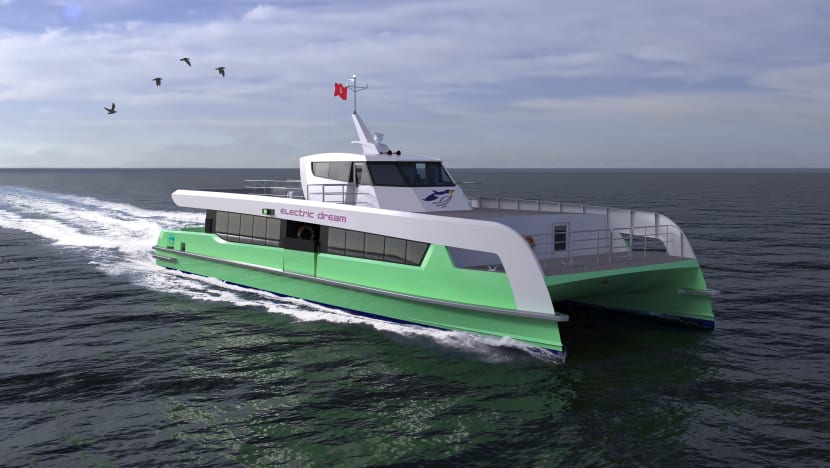Shell to switch to fully-electric ferries for passengers to Pulau Bukom refinery

Shell Singapore will switch to fully-electric ferries to transport passengers to its energy and chemicals park on Pulau Bukom, as the company continues a repurposing of its core business towards a low-carbon future.
The electric vessels are expected to replace the existing diesel-powered ferries in the first half of 2023, in what the energy giant called "a first for Shell globally".
Singapore company Penguin International has been awarded the contract to design, build and operate at least three fully-electric ferries, Shell said in a press release on Wednesday (Sep 22).
The 200-seater, single-deck ferries will be powered by a lithium-ion battery system with a capacity of 1.2 megawatt hours. They will run at speeds of more than 20 knots (37kmh) with "zero emissions and noise", said Shell.
When berthed at Shell's Pulau Bukom complex, the ferries will be charged via a combination of fast charging during peak hours, and slow charging during off-peak hours and overnight, the company said.
The approximately 5.5km ferry route off the Straits of Singapore is a "busy connection" that transports about 3,000 passengers a day, or about 1.8 million passenger trips annually, added Shell.
"Shipping's future will involve different parts of the sector using different fuels, and electrification is a solution to decarbonise short voyages, including port operations," said Mr Nick Potter, general manager of Shell Shipping and Maritime, Asia Pacific and the Middle East.
"Switching to zero-emission, fully-electric ferries is part of Shell's ambition to help accelerate progress towards net-zero emissions in the shipping sector."
Penguin International managing director James Tham said the project involved "real-world commercial application of marine electrification" with a "safe and reliable end-to-end solution that meets Shell's standards".
Maritime and Port Authority of Singapore's (MPA) chief executive Quah Ley Hoon said MPA was committed to lowering the carbon footprint of Singapore's harbourcraft and port operations.
"Shell's bold move to commission new fully-electric ferries will take us a step closer to making a low-carbon future a reality for our maritime sector," she said.
In November last year, Shell said it plans to repurpose its core business and halve its crude processing capacity at its Pulau Bukom oil refinery, as part of an overhaul in its journey towards a low-carbon future.
As part of its plans, Shell said it would reduce the crude processing capacity at Pulau Bukom - its largest refinery - to 250,000 barrels of oil per day from the current 500,000.
It added that Pulau Bukom would be one of six oil refining and petrochemical sites that the company would keep, down from 14.
In April, Shell said it was working with partners to trial the use of hydrogen fuel cells for ships.
Source: www.channelnewsasia.com
